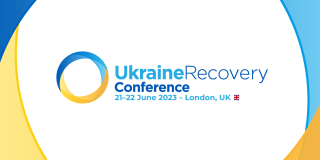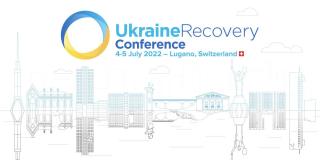Preamble: As the co-chairs of the 2019 Toronto Ukraine Reform Conference, the Government of Canada and the Government of Ukraine, state the following:
Context
- In 2014, Ukrainians had a Revolution of Dignity. They peacefully defended their vision of a European and Euro-Atlantic future. In July 2019, in Toronto, we held the third Ukraine Reform Conference to reaffirm our partnership in Ukraine’s sovereignty, security and prosperity and to support Ukraine’s Euro-Atlantic vision. Ukraine’s security is essential for Europe and global stability. We know that we will all benefit from greater prosperity, transparency, accountability and security in Ukraine.
- Building on the momentum of the 2017 London Conference and the 2018 Copenhagen Conference, we recognized the potential opportunities and new challenges facing Ukraine; and the importance of completing and making irreversible key reform achievements. We will partner with Ukraine as it takes the next important steps forward in consolidating this dynamic democracy, in the very heart of Europe.
- Ukraine has made impressive progress in the past five years in implementing its comprehensive reform agenda. This is even more remarkable given that reform results have been achieved against the backdrop of ongoing Russian aggression, including the illegal occupation of Crimea and support for illegal armed units in parts of the Donbas. Since we last met in Copenhagen, there have been further negative developments, including the attack on Ukrainian vessels near the Kerch Strait, the detention of Ukrainian sailors and Russia’s destabilizing decision to extend citizenship to inhabitants of parts of the Donbas. These provocative and unwarranted actions continue to create displacement, hardship and unnecessary suffering for populations living in this part of Ukraine’s sovereign territory.
Democratic elections
- Ukraine’s recent internationally recognized free and fair presidential election underscored Ukraine’s commitment to democratic accountability and the rule of law. The election demonstrated the vibrancy of Ukraine’s democracy and the continued desire for change expressed by so many.
- Ukraine’s friends and partners noted Ukraine’s commitment to meeting the same high standards in the parliamentary elections to take place July 21. Ukraine’s democracy and resolute commitment to the rule of law remain the essential foundation for advancing a reform agenda that will build a modern, prosperous and resilient nation that benefits all of its citizens.
- We recognized the importance of working together to prevent, combat and constrain any efforts to interfere in our sovereign democratic processes. We discussed Russia’s use of hybrid aggression in Ukraine and elsewhere and the need to counter Russian propaganda and disinformation, cyber-attacks and attempts to undermine our democratic institutions and procedures.

Commitment by the Ukrainian government
- Recognizing the centrality of reforms in delivering more prosperity to Ukraine’s people, the President of Ukraine attended the Toronto Conference and presented his vision for reform priorities, placing the wellbeing of citizens at the heart of reform; furthering European and Euro-Atlantic integration, consolidating democracy and the rule of law; building a prosperous nation and well-functioning market economy, and combatting corruption.
- In this regard, a lot has been done. Under the current government, Ukraine has adopted the Government Priority Action Plan to 2020, which is an absolutely fundamental document setting out a plan of step-by-step actions to achieve economic growth, ensure effective governance, human capital development, rule of law and fight against corruption, security and defence.
- Despite all the external and internal challenges, Ukraine has achieved an increase of real GDP of 8.4% within the last three years. Ukraine has also managed to stabilize the national currency’s exchange rate. Inflation in 2018 was less than 10%, which is the lowest indicator for the last five years. Thanks to the government’s efforts, Ukraine has also improved its business climate and increased its position in Doing Business Ranking by 41 points. The country has continuously got rid of outdated regulations that were introduced either during the Soviet era, or five to 15 years ago, and are limiting opportunities for business development.
- Ukraine continues to work to ensure further integration into the EU. Over two thousand Ukrainian technical standards have been already harmonized with EU norms. Ukrainian exports of goods and services to the EU have increased 1.5 times to US$22 billion within the last three years.
- Speaking of effective governance, the implementation of the 2020 Public Administration Reform Action Plan helped increase the attractiveness of civil service. The number of applicants increased from 1.7 to 24 candidates per one position, which has significantly improved competition.
- Ukraine is successfully implementing decentralization reform. A total of 888 united territorial communities (approx. 70% of the entire rural population) have been established. However, our goal is for 100% of Ukrainians to enjoy the benefits of decentralization. Thanks to the reform, the total income of local budgets has increased by 3.3 times. Salaries and pensions of Ukrainians are increasing. Ukraine has also established the National Health Service of Ukraine and the New Ukrainian School.
- With regard to narrowing the field for corruption, the public e-procurement and e-auctions systems, ProZorro and ProZorro.Sales were introduced; administrative services centres, transparent offices, open space offices, and a wide range of e-services were launched. All of these steps increase transparency.
- These joint governmental results provide a basis for the next wave of Ukraine’s transformation—a transition to the citizen-oriented model of growth for all, which will focus on improving the quality of life of all Ukrainians.
Recognition of the Toronto Principles
- We recognized the role and commitment of Ukrainians to their democratic future and welcomed the important contribution of civil society in presenting to the Conference the “Toronto Principles.” These principles reflect many months of work and consultation across Ukraine, including with the private sector and marginalized groups, to identify joint principles and reform priorities and the shared responsibility of government and engaged citizens in moving Ukraine forward to a better future for all Ukrainians. These principles will serve as an important reference point for all those seeking to contribute to Ukraine’s European and Euro-Atlantic future and we encouraged this vigorous civil society, private sector and government partnership around reforms to continue and to deepen.
Reinforcing and protecting foundational reforms
- We celebrated important progress on decentralization, public administration reform, health care, education and pension reforms that have begun to deliver more effective government services to the people who need them. Foundational changes in procurement processes; in national security and defence; and institutional reform in the banking sector—including an independent central bank—have put Ukraine on a positive trajectory to meeting new and higher standards of accountability, transparency and governance. We recognize that there is, however, much more to be done in these, and other, key areas.
Critical points
- Because of our deep commitment and partnership with Ukraine on its long-term democratic journey, we noted key reform areas that we believed could be vulnerable or where there was risk of backsliding. These included the reform of state-owned enterprises, the urgent need to re-criminalize illegal enrichment, the need to ensure the necessary independence and effective functioning of all anti-corruption institutions, and the independence of the National Bank of Ukraine.
- It is critical that Ukraine continue to work with its partners—the IMF, EU and bilateral donors—to meet and complete reforms agreed as part of these programs. We will work with Ukraine to ensure continued progress in these areas to further assist Ukraine in implementing reforms, including by allocating funds.
The future agenda
- We are all learning that governments must ensure that the well-being of all citizens is at the heart of democratic governance. Similarly, we know that reforms must both establish the proper macro-economic foundations and be citizen-focused with real and recognizable benefits in daily life. We recognize that governments must focus much more clearly on serving their people. There is a social contract between a government and all its citizens, which is the foundation of trust.
- This means that special attention needs to be paid to being inclusive and to recognizing that everyone needs to benefit from progress and growth in their societies—women, men, elderly, youth, rural, urban, those in marginalized and often victimized communities, ethnic and religious minorities, the LGBTQ community. Ukraine, whose multicultural and ethnically diverse communities have for centuries lived side-by-side, understands that pluralism and multiculturalism are strengths, as is inclusiveness. In Ukraine, the populations of illegally occupied Crimea and conflict-affected Donbas, including those dislocated from their homes and families, require particular attention and consideration.
Confidence of the people
- Trust in government, and in institutions is dependent upon resolute efforts to address anti-corruption and the existing residual culture of cronyism and oligarchy. These vestiges of the past are inhibiting Ukraine from reaching its full potential. While they are difficult to overcome, determined political leadership underpinned with the support of Ukrainians and enabled by the international community, can free Ukraine from the burden of this lingering post-Soviet culture.
Prioritization will be key
- Ukraine will have the firm support of its international partners in prioritizing and accelerating reforms to build confidence in a reformed justice system; to promote competition in the economy by prohibiting monopolies and the concentration of economic power; to develop a transparent and well-planned land market reform and privatization program centered on the reform of state-owned enterprises, including governance; and to produce a better regulatory framework.
Fundamental reforms
- Political plurality is a strength, as is inclusiveness. Health care, education, pensions and the enshrining and protection of human rights—in all dimensions—must be foundational in reforms and steps taken by Ukraine on its European and Euro-Atlantic journey. A fully independent and free media is also an essential element of any democratic country.
- Good governance through continued effective public administration reform will provide an essential foundation for accountability and will build trust. Resilient, accountable and transparent public institutions, and a professional public service dedicated to serving the people and meeting the needs of all Ukrainians are foundational to Ukraine’s future. A reset of the public administration system with a shift to a citizen-oriented governance culture is an absolute necessity to build a democratic country.
- Decentralization has shown how reform can be inclusive and successful. In Toronto, we welcomed many representatives from local communities who showcased the progress made in the course of voluntary amalgamations and the need to continue with the next challenging steps in this important reform area.
- Embedding the rule of law across the entire justice system is a vital enabler for economic growth. Combatting corruption in all areas of Ukrainian economic life through proper governance, transparency and a change in culture, is a necessary and key step in helping Ukraine meet its future vision. Critical to this will be the finalization of all procedures to set up the High Anti-Corruption Court of Ukraine and its prompt launch on September 5, 2019; along with relaunching the reform of the judiciary, building on previous progress related to the National Agency for the Prevention of Corruption, restarting reform of the Prosecutor General’s Office, keeping the National Anti-Corruption Bureau of Ukraine intact and ensuring the effective functioning and independence of all institutions.
- Security sector reform and democratic accountability and civilian control of the security sector and the military are fundamental to entrenching the rule of law and meeting Euro-Atlantic standards and principles. Implementing fully—in letter and in spirit—the ambitious program of reform outlined in the Law on National Security, and transforming the culture and practices of the defence and national security sector is critical for moving Ukraine closer to its partners.
- We know that the Ukrainian armed forces are better trained, better equipped and better prepared than ever before, in part thanks to the strong support of Ukraine’s friends and partners. The next important steps of security sector transformation must focus on governance, planning, procurement, structure, command and control and a comprehensive approach to security. In the defence sphere, there is an important defence review that will lay the groundwork for the next chapter of transformation beyond 2020. Ukraine’s partners will work to support these important efforts.
- Energy sector reform is urgent, given Ukraine’s strategic role as a transit country for gas. This includes comprehensive gas and electricity market reform and the completion of unbundling.
- Land reform and lifting the moratorium on agricultural land sales is the most powerful measure the government can take to boost economic growth and job creation, particularly in rural areas. More than 70% of Ukrainian territory is classified as agricultural land, which is exceptionally fertile. Meaningful reform of the land sector must include ensuring proper land management, providing incentives for long-term investment and access to credit, and the transfer of land to its most productive uses. The resulting boost to agricultural productivity could add billions to annual output and boost public revenue.
Continuity, change and a vision of the future
- Ukraine has stated clearly its vision: a European and Euro-Atlantic future where reforms and growth will include and benefit all of its citizens. The impressive progress and successes of reform to date are due to the commitment of the Government of Ukraine and the hard work, resilience and determination of Ukrainians to make a better future for themselves and generations to come. Ukraine’s friends and partners—present in Toronto—along with Ukraine’s president and senior leaders from government, recognize that there needs to be change, but there is also already much to build on, and that there is a need to maintain the momentum of reform. We brought the vision of innovation, opportunity and democracy in Ukraine to the Toronto Ukraine Reform Conference with Ukraine House. During our days together in Toronto, there was an overwhelming sense of partnership and commitment, inclusivity and respect, energy and enthusiasm, resilience and resoluteness to build on success and to realize this future vision—together.
- We welcome the Republic of Lithuania’s offer to host the 2020 Ukraine Reform Conference.
Related links:
Outcomes of Third International Ukraine Reform Conference in Toronto
Public Administration Reform: Dicomunisation of Public Sector



